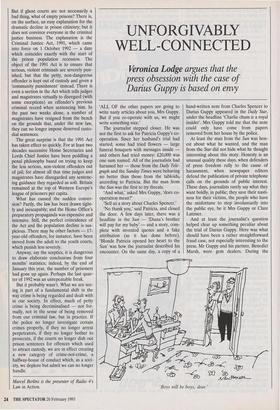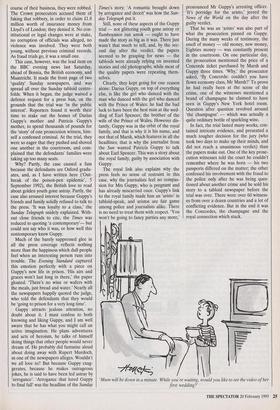UNFORGIVABLY WELL-CONNECTED
Veronica Lodge argues that the
press obsession with the case of Darius Guppy is based on envy
`ALL OF the other papers are going to write nasty articles about you, Mrs Guppy. But if you co-operate with us, we might write something nice.'
The journalist stepped closer. He was not the first to ask for Patricia Guppy's co- operation. Since her husband's trial had started, some had tried flowers — large funeral bouquets with messages inside and others had tried money: £20,000 was one sum named. All of the journalists had harassed her — those from the Daily Tele- graph and the Sunday Times were behaving no better than those from the tabloids, according to Patricia. But the man from the Sun was the first to try threats.
`And what,' asked Mrs Guppy, 'does co- operation mean?'
`Sell us a story about Charles Spencer.'
`No thank you,' said Patricia, and closed the door. A few days later, there was a headline in the Sun — Diana's brother will pay for my baby' — and a story, com- plete with invented quotes and a fake attribution (as it has done before). `Blonde Patricia opened her heart to the Sun' was how the journalist described his encounter. On the same day, a copy of a hand-written note from Charles Spencer to Darius Guppy appeared in the Daily Star, under the headline 'Charlie chum is a royal insider'. Mrs Guppy told me that the note could only have come from papers removed from her house by the police.
At least the man from the Sun was hon- est about what he wanted, and the man from the Star did not hide what he thought interesting about this story. Honesty is an unusual quality these days, when defenders of press freedom rally to the cause of harassment, when newspaper editors defend the publication of private telephone calls on the grounds of public interest. These days, journalists rarely say what they want boldly, in public; they save their nasti- ness for their victims, the people who have the misfortune to step involuntarily into the public eye, be it Mrs Guppy or Clare Latimer.
And at least the journalist's question helped clear up something peculiar about the trial of Darius Guppy. Here was what should have been a rather straightforward fraud case, not especially interesting to the press. Mr Guppy and his partner, Benedict Marsh, were gem dealers. During the
'Boys will be boys, dear.'
course of their business, they were robbed. The Crown prosecutors accused them of faking that robbery, in order to claim £1.8 million worth of insurance money from Lloyd's of London; they denied it. No con- stitutional or legal changes were at stake, no corruption of officials was alleged, no violence was involved. They were both young, without previous criminal records. As fraud trials go, it was a small one.
This case, however, was the lead item on the BBC evening news last Saturday, ahead of Bosnia, the British economy, and Maastricht. It made the front page of two `quality' Sunday newspapers, and was spread all over the Sunday tabloid centre- folds. When it began, the judge waived a defence request for a press ban, on the grounds that the trial was 'in the public interest'. Reporters found it worth their time to stake out the homes of Darius Guppy's mother and Patricia Guppy's mother, to spend thousands of pounds for the 'story' of one prosecution witness, him- self a confessed criminal. At the trial, they were so eager that they pushed and shoved one another in the courtroom, and com- plained that the defendants' families were taking up too many seats.
Why? Partly, the case caused a fuss because the defendants are Oxford gradu- ates, and, as I have written here (`Out- break of the poison-pen epidemic', 5 September 1992), the British love to read about golden youth gone astray. Partly, the case also aroused interest because Guppy's friends and family solidly refused to talk to the press. 'It was loyalty to a class,' the Sunday Telegraph snidely explained. With- out close friends to cite, the Times was reduced to quoting 'a contemporary'— but could not say who it was, or how well this contemporary knew Guppy.
Much of the barely suppressed glee in all the press coverage reflects nothing more than the happiness which dull people feel when an interesting person runs into trouble. The Evening Standard captured this emotion perfectly with a piece on Guppy's new life in prison. 'His airs and graces won't last long in there,' the paper gloated. 'There's no wine or wafers with the meals, just bread and water.' Nearly all the newspapers happily quoted the judge, who told the defendants that they would be 'going to prison for a very long time'.
Guppy attracts jealous attention, no doubt about it. I must confess to both knowing and liking Guppy, and I am well aware that he has what you might call an active imagination. He plans adventures and acts of heroism, he talks of himself doing things that other people would never dream of. He probably did fantasise aloud about doing away with Rupert Murdoch, as one of the newspapers alleges. Wouldn't we all love to? But because Guppy exag- gerates, because he makes outrageous jokes, he is said to have been led astray by `arrogance'. 'Arrogance that lured Guppy to final fall' was the headline of the Sunday Times's story; 'A romantic brought down by arrogance and deceit' was how the Sun- day Telegraph put it.
Still, none of these aspects of the Guppy trial — not glittering youth gone astray or flamboyance run amok — ought to have made the story as big as it was. There just wasn't that much to tell, and, by the sec- ond day after the verdict, the papers seemed to be grasping for news — the tabloids were already relying on invented stories and old photographs, while most of the quality papers were repeating them- selves.
Clearly, they kept going for one reason alone: Darius Guppy, on top of everything else, is like the girl who danced with the man who danced with the girl who danced with the Prince of Wales: he had the bad luck to have been the best man at the wed- ding of Earl Spencer, the brother of the wife of the Prince of Wales. However dis- tantly, Guppy was in the orbit of the royal family, and that is why it is his name, and not that of Marsh, which features in all the headlines; that is why the journalist from the Sun wanted Patricia Guppy to talk about Earl Spencer. This was a story about the royal family, guilty by association with Guppy.
The royal link also explains why the press feels no sense of restraint in this case, why the journalists feel no compas- sion for Mrs Guppy, who is pregnant and has already miscarried once. Guppy's link to the royal family made him an `aristo' in tabloid-speak, and aristos are fair game among police and journalists alike. There is no need to treat them with respect. 'You won't be going to fancy parties any more,' pronounced Mr Guppy's arresting officer. `It's porridge for the aristo,' jeered the News of the World on the day after the guilty verdict.
That he was an `aristo' was also part of what the prosecution pinned on Guppy. During the many weeks of testimony, the smell of money — old money, new money, Eighties money — was constantly present in the courtroom. On one particular day, the prosecution mentioned the price of a Concorde ticket purchased by Marsh and Guppy three times. 'Why,' the prosecutor asked, 'fly Concorde: couldn't you have flown economy class, Mr Marsh?' To prove he had really been at the scene of the crime, one of the witnesses mentioned a brand of champagne he claimed to have seen in Guppy's New York hotel room. Question after question revolved around 'the champagne' — which was actually a quite ordinary bottle of sparkling wine.
In fact, the trial lasted many weeks, con- tained intricate evidence, and presented a much tougher decision for the jury (who took two days to make up their minds, and did not reach a unanimous verdict) than the papers make out. One of the key prose- cution witnesses told the court he couldn't remember where he was born — his two passports differed on the matter; the other confessed his involvement with the fraud to the police only after he was being ques- tioned about another crime and he sold his story to a tabloid newspaper before the trial was over. There were over 60 witness- es from over a dozen countries and a lot of conflicting evidence. But in the end it was the Concordes, the champagne and the royal connection which stuck.
'Mum will be down in a minute. While you're waiting, would you like to see the video of her first wedding?'



























































 Previous page
Previous page